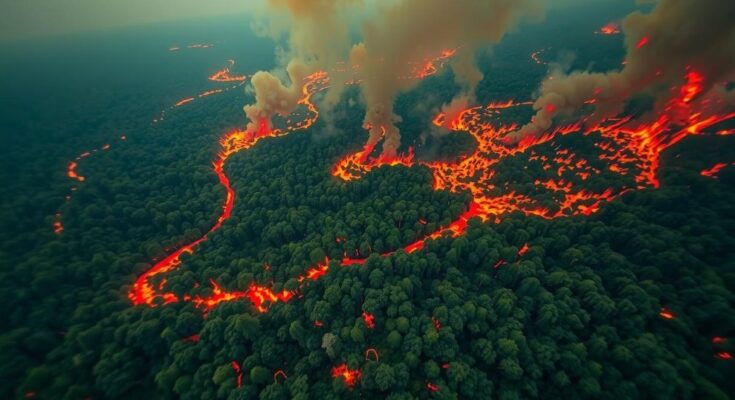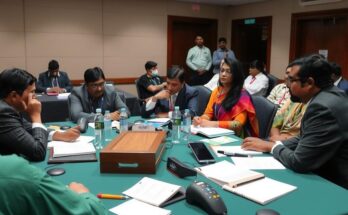The Amazon rainforest has experienced record-breaking wildfires in 2024, with burned acreage up by 846% compared to 2023, prompting concerns that criminals are exploiting climate conditions. The destruction, driven by severe drought and possibly illegal land-clearing activities, highlights the urgent need for effective conservation policies as Brazil prepares for COP30.
Recent analyses have revealed alarming increases in wildfires across Brazil, particularly in the Amazon rainforest, where unprecedented acreage has been devastated. Satellite data indicates that from January to mid-October 2024, wildfires destroyed an area equivalent to the size of Switzerland, registering an astounding 846% increase compared to the same period in 2023. This surge in destruction can be attributed to severe drought conditions exacerbated by climate change and the El Niño phenomenon, as well as allegations that criminals are exploiting these environmental factors to facilitate illegal land clearing and ranching operations. The devastation comes in light of the upcoming U.N. climate conference where global leaders aim to address biodiversity preservation. Criminals typically initiate deforestation using chainsaws, but recent events suggest that, due to the current drought, they are bypassing traditional methods in favor of igniting fires directly. “The drought played a major role in fueling the spread, but fire has also been weaponized,” stated Ane Alencar, science director at the Amazon Environmental Research Institute. The consequences of such fires are dire. The Amazon rainforest, renowned for its biodiversity, is suffering immensely; species are becoming increasingly vulnerable as temperatures rise in already depleted habitats. Official assessments indicate that fires have devastated regions like Jamanxim National Forest, where illegal cattle ranching has been rampant. Despite these challenges, there are signs of governmental response, including a potential mandate to require reforestation of burned areas to thwart land-grabbing practices. The recent data underscores an urgent need for effective policies that confront the intertwined issues of criminality and climate change, as well as enhanced cooperation between local and federal authorities. The far-reaching implications of this crisis not only threaten Brazil’s ecological integrity but also contribute significantly to global climate change dynamics.
The Amazon rainforest plays a critical role in regulating the Earth’s climate, supporting immense biodiversity and serving as a significant carbon sink. However, recent conditions, primarily driven by human-induced climate change and natural climate variability such as El Niño, have intensified droughts and wildfires in the region. With record deforestation, officials are concerned that the devastating impacts are being leveraged by criminals engaging in illegal land activities, which are now occurring on an unprecedented scale. As these threats mount, international focus on preserving the Amazon is becoming increasingly urgent, especially in light of significant upcoming global climate conferences.
In conclusion, the concerning rise of wildfires in Brazil’s Amazon can be attributed to a combination of climate change and criminal exploitation of environmental conditions. The dramatic increase in burned areas raises critical questions about the resilience of the forest and the effectiveness of current policies aimed at conservation. Moving forward, collaborative efforts between various levels of government and the introduction of stringent reforestation mandates may be necessary to combat this escalating crisis and promote ecological restoration.
Original Source: apnews.com




